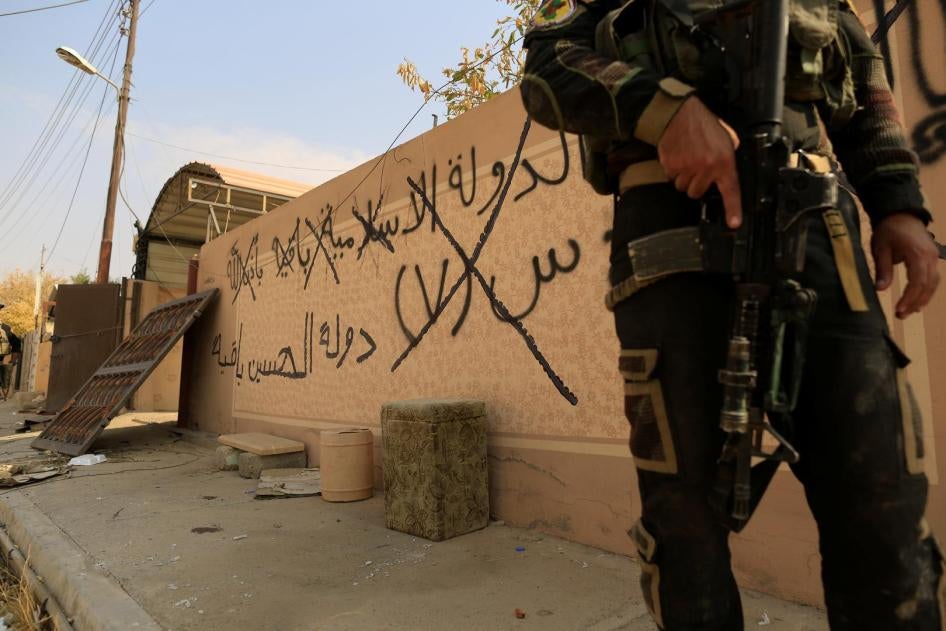The videos and photographs that have emerged of Iraqi soldiers from the Interior Ministry’s elite Emergency Response Division brutally taunting, torturing, and executing alleged supporters of the Islamic State (also known as ISIS) and their family members had an eerie, distressing familiarity. In the course of Iraq’s tragic modern history, we have witnessed so many Iraqi citizens enduring the ugliest of assaults at the hands of combatants wearing a variety of uniforms.
The torturers depicted in these recent videos seem to borrow from their grotesque predecessors. We see Saddam-era tactics, as officers hang by their arms one of two brothers alleged to support ISIS, then tearing out both their beards, putting a knife to their ears, and shocking them with live wires. The videos show officers beating shackled detainees hanging from a ceiling, while the officers joke and jostle among themselves and casually record their atrocities, reminding us of the vile images of United States soldiers at Abu Ghraib prison. We also see soldiers summarily executing handcuffed detainees as “revenge,” like so many post-Saddam Iraqi forces fighting armed groups. And taking a page from ISIS itself, Iraqi officers bizarrely force one detainee to recite the pledge of fealty to the ISIS leader before reportedly murdering the detainee. In all these incidents, the Iraqi soldiers show little shame or fear in their vile actions, which they appear to relish recording and sharing on cellphones.
These videos are not the only evidence of serious abuses by Iraqi security forces in their battle against ISIS. Human Rights Watch has documented a wide variety of serious human rights violations. We have documented summary executions of suspected ISIS fighters, detention in inhumane conditions, and collective punishment against family members of ISIS fighters, including home demolitions and forced deportations. We also documented the arbitrary detention of over a thousand Sunnis displaced from the fighting in ISIS-held areas. There is virtually no information about ISIS fighter casualties or captures: we don’t know how many have been killed and how many have been detained.
While the reality is that the majority of ISIS fighters are Sunni Iraqis, the Iraqi government needs to recognize that winning the support of all Iraqis, in particular Sunni communities, requires persuading them that it stands for something different, something better. The government’s legitimacy will ultimately rest on its demonstrated respect for the rule of law, an end to discrimination and attacks against the Sunni community, and accountability for the atrocities carried out by its security forces like those depicted in these videos. Government abuses against Sunnis were a major factor behind the start of the civil war in 2014 and the government will risk losing the peace if it fails to rein in its security forces now.
Prime Minister Haider al-Abadi has repeatedly said the right things about the need to exercise civilian control over, and curb abuses by, the country’s armed forces. There is no reason to doubt his sincerity, but plenty of reason to doubt his willingness and ability to impose the accountability and reforms he has promised. Because his hold on power is fragile and his authority is almost completely dependent on the Iraqi security forces and pro-government militias, there is little incentive to follow through on the countless investigations he has announced. We know of few, if any, Iraqi soldier or officer investigated and convicted for abuses.
Will we finally see real teeth in the prime minister’s response to this latest evidence? The names of the officers shown in these videos are known. One of the captains, identified as Omar Nazar, is recorded justifying his executions as necessary to ensure battlefield justice and to save money having to feed ISIS detainees. Will an Iraqi court investigate and try these men? Will there be compensation to family members of those tortured and executed?
The US and other members of the anti-ISIS coalition risk complicity in Iraqi abuses given their participation in military operations with the country’s security forces. The US military and embassy in Iraq deny having a record on the Emergency Response Division, the elite unit involved, in their abuse database. They refuse to confirm or deny that Ali Abd Al Hussein Abd, one of the torturers filmed, is a US citizen or ever worked with them. He was allegedly known as the unit’s liaison with coalition forces, and nicknamed “Ali Mushtarakah” (“Ali the [US] partner”).
The US also denies that it is arming the elite unit – but won’t say if it has in the past. It’s all a bit of a shell game, as the US government continually shifts its resources away from a particular abusive unit, only to have the weapons and materiel it provides turn up in their hands anyway, or to rebrand its assistance as going generally to a government ministry.
That’s why our recommendation has been to condition all military support on demonstrable, measurable steps by the Iraqi government to end abuses by its security forces and taking significant measures to hold accountable those suspected of carrying out or failing to halt such abuses.
As the decades of fighting in Iraq have shown, winning battles against armed groups is something the Iraqi government can accomplish. Where it has repeatedly failed, and stands to fail again without urgent steps to establish military discipline and accountability, is winning the struggle for a united, rights-respecting and peaceful Iraq.









